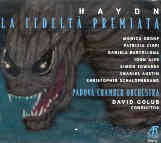Composed for the re-opening of the Esterhaza opera house in 1781, La fedelta premiata, a pastoral semi-buffa opera, concerns itself with the goddess Diana’s decree, due to some sort of previous sacrilege, that every two years a couple of faithful lovers be sacrificed to a sea monster until some heroic (duh) character offers his own life. The villain in the piece is Melibeo (bass), a high priest who’s in love with Amaranta (mezzo) who in turn seems taken with the berserk, delusional Perrucchetto (baritone) who is mad about her. Fileno (tenor) is in love with Celia (mezzo) and vice-versa but Melibeo is trying to get Celia killed. Amaranta’s brother, Lindoro (tenor), varies between loving the nymph Nerina (soprano) and Celia. Fileno eventually offers himself as sacrifice when he realizes that Celia and Perrucchetto have been marked for death by Melibeo, but Diana appears and all ends happily.
The work is musically sophisticated, with wonderful writing for horns, a terrific act-finale or two, and some very moving scenes in Act 2 when Celia thinks Fileno is dead (in fact, his would-be suicide knife breaks on a tree stump as he’s carving his suicide note and complaining about Celia’s presumed infidelity). By the way, the overture is the finale of Haydn’s Symphony No. 73 “La Chasse”. As is always the case with Haydn, this opera is far too long, and we should be glad we can hear it on CD rather than having to sit through it in the theatre. An impressive recording under Antal Dorati was released in 1976 (Philips), and this one is every bit as good and in many ways better.
Despite the silly plot, the characters are well-drawn. Daniela Barcellona is superb as the constantly outraged Amaranta. Her music ranges from lovely to wild and she excels in both and everything in-between, including very lively recitative. John Aler as Fileno and Simon Edwards as Lindoro are better than their counterparts on Philips, singing with more assuredness, passion, and involvement, not to mention security. Patricia Ciofi’s fickle Nerina is lovely but not quite as beguiling as Ileana Cotrubas on the earlier recording; Alan Titus and Christopher Schaldenbrand are tied as Perrucchetto, though the latter really does sound crazier. Charles Austin’s Melibeo is not very menacing, but he sings well, and Monica Groop way outsings the wobbly Lucia Valentini-Terrani as Celia. The late David Golub, who was a fine pianist-turned-conductor, leads a spirited, focused, as-dramatic-as-possible performance, and his Paduan forces are surely the equal of Dorati’s Lausanne group. If I had to own only one recording of this work–which, happily, is the case–it would be this one.
































